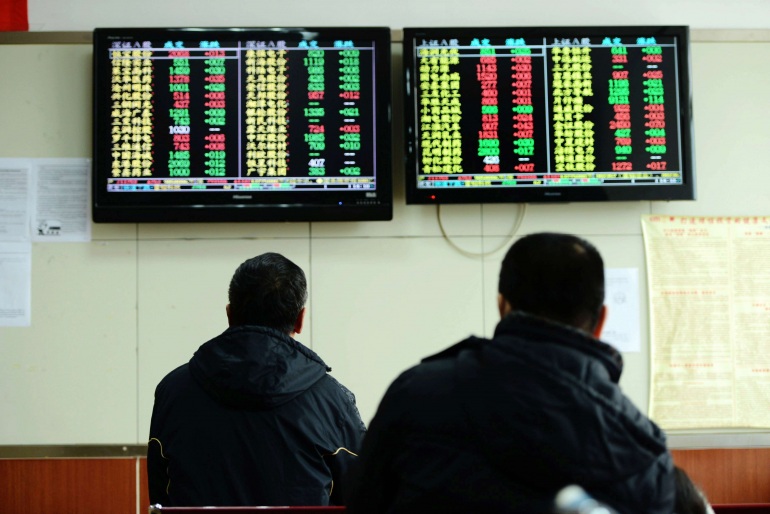Challenging China's one-bidder policy

Chinese investors look at prices of shares at a stock brokerage house in Qingdao city, East China's Shandong province. (AP photo)
When BHP Billiton put its Ravensthorpe nickel asset on the auction block, there were several Chinese bidders interested. However, once the Chinese regulator anointed China Metallurgical Corporation as the preferred bidder, others dropped out.
When Chinese companies want to invest overseas, they first have to win a beauty contest held at the National Development Reform Commission, which oversees international mergers and acquisitions.
They have to demonstrate to the NDRC why they are the best company to acquire the overseas asset. The commission will consider competing proposals from bidders and grant a ‘road pass’ – industry parlance for approval of the company it considers to be the best bidder.
The logic behind the one-bidder policy is simple. Andrew Michelmore, chief executive of MMG, a Chinese-owned and Melbourne-headquartered mining company, says that given state-owned banks mostly finance overseas acquisitions, it is in China’s best interest not to bid up the price through competing offers from Chinese entities.
For example, when Shanghai Automotive Industry Corp, the largest carmaker in China, made a tilt at Korean automaker Ssangyong, the emergence of another Chinese bidder at the auction forced SAIC to increase its final offer.
In principle, the government should not be in a position to judge who is the best bidder for overseas assets. However, in China this is considered necessary because the country’s economic system favours certain state-owned players. They often have access to cheap credit from state-owned banks and some senior executives prefer market share and size over profitability.
As a result, some Chinese companies are happy to pay above market price for assets. Regulators like the NDRC and the state-owned Assets Supervision and Administration Commission, which oversees the 113 largest state-owned companies, are very concerned about fratricidal wars between Chinese companies abroad.
So the NDRC normally just grants one road pass to bidders that are going after the same assets, preventing Chinese companies from bidding against each other at the ultimate cost to the Chinese state.
However, there are several cases in recent years that show the official ‘one Chinese bidder’ policy is under threat, especially in light of the recent relaxation of the outbound investment approval process.
This is an important development for the mergers and acquisitions market in Australia and overseas. Chinese players have emerged in the last few years as the most active M&A dealmakers.
If Beijing were to relax its one-bidder rule, it would certainly make the bidding process more competitive and benefit the sellers of assets. It would also make it easier for target boards and their advisors to deal with situations where there are multiple Chinese bidders.
In early 2012, two Chinese construction machinery companies, Zoomlion and Sany, were bidding for German concrete pumping company Putzmeister. Zoomlion got its road pass from the NDRC, but Sany gazumped Zoomlion by signing a binding agreement with Putzmeister before it had even obtained a road pass. The NDRC eventually gave the green light to Sany’s bid.
There was a lot of speculation about Sany’s ability to out-manoeuvre both the NDRC and Zoomlion, a powerful state-owned enterprise. Two factors stood out” Sany financed the deal out of its own cash reserve and had no need to obtain state-backed financing, and Sany’s chairman Liang Wengeng is powerful businessman with strong political ties.
Most recently, two Chinese state-owned companies, Tsinghua Unigroup and Shanghai Pudong Science and Technology Investment, both bid for NASDAQ-listed RDA Microelectronics in late 2013.
Tsinghua won the two-way bidding war, despite the fact that the NDRC had only granted approval to Shanghai Pudong. Media reports suggested that the NDRC was not likely to bless Tsinghua’s fait accompli but the company was adamant that it could secure the regulator’s blessing and agreed to pay $70 million if it could not.
M&A lawyers and bankers waited keenly on the outcome of the case to provide them with better clarity over the one-bidder principle. However, the change to the outbound approval rule, which increased approval threshold increased to one billion, rendered the decision unnecessary.
“Had the Chinese regulators not eased outbound investment rules, the NDRC’s decision would have provided greater clarity to assist target boards and their advisors to navigate competitive situations where multiple Chinese bidders participate,” said Paul Schroder and Xiong Jin, partners from King & Wood and Mallesons, who have advised on some of the biggest Chinese transactions in recent years.
While it is the market perception that the NDRC only grants one road pass to Chinese bidders chasing after the same assets – with the result that Chinese companies will not bid against each other – recent cases suggest that perception is not always correct.
Beijing has taken positive steps to simplify the outbound approval process, returning investment decision-making powers to companies and individuals. As such, road passes may be become a thing of past in the not-too-distant future. This is good news for Australian assets sellers who can benefit from a more competitive bidding process.
Follow Peter Cai on Twitter: @peteryuancai
Subscribe to the China Spectator newsletter: http://bit.ly/ChinaSpec













